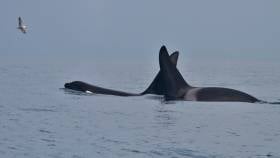Displaying items by tag: Scottish West Coast Community Group
#MarineWildlife - Two killer whales spotted feeding off the Blasket Islands earlier this week have been identified as members of a unique pod from Scotland.
“Killer whale sightings in any Irish waters are rare events, and they seem to be getting rarer,” said Pádraig Wholley of the Irish Whale and Dolphin Group, whose member Nick Massett photographed the orcas in Dingle Bay on Monday 5 March.
Massett identified one of the two cetaceans immediately as John Coe, and its partner as another adult male, Aquarius. RTÉ News says the orcas were likely hunting seals in the area.
Both are members of the genetically distinctive Scottish West Coast Community Group, which commonly feeds in the Hebridean Islands but has previously been found as far as Lough Swilly and Scotland’s east coast, likely in search of food.
“Colleagues from the Hebridean Whale & Dolphin Trust can confirm that John Coe was seen exactly seven days [previously] in Scottish waters … which tells us a lot about the movements of this highly mobile apex predator,” said Wholley.
The Scottish West Coast Community Group has been feared to be on the ‘brink of extinction’ for many years. In January 2016 the pod lost a female member, Lulu, due to what was at first thought to be entanglement with fishing gear but was later blamed on PCB pollution.






























































